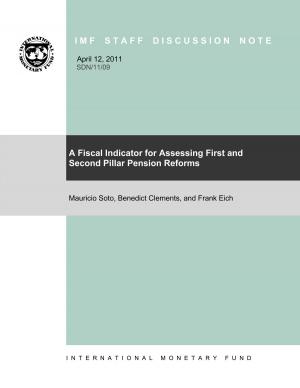Fiscal Monitor, September 2011: Addressing Fiscal Challenges to Reduce Economic Risks
Business & Finance, Economics, Public Finance, Money & Monetary Policy, Finance & Investing, Taxation| Author: | International Monetary Fund. Fiscal Affairs Dept. | ISBN: | 9781463957933 |
| Publisher: | INTERNATIONAL MONETARY FUND | Publication: | September 20, 2011 |
| Imprint: | INTERNATIONAL MONETARY FUND | Language: | English |
| Author: | International Monetary Fund. Fiscal Affairs Dept. |
| ISBN: | 9781463957933 |
| Publisher: | INTERNATIONAL MONETARY FUND |
| Publication: | September 20, 2011 |
| Imprint: | INTERNATIONAL MONETARY FUND |
| Language: | English |
Despite progress in addressing key fiscal weaknesses in many countries, significant policy challenges remain in advanced, emerging, and low-income economies, and must be faced in an environment where downside risks to growth have increased. Many advanced economies face very large adjustment needs to reduce risks related to high debt ratios. The appropriate pace of adjustment in the short run will depend, for each country, on the intensity of the market pressure it confronts, the magnitude of the risks to growth it faces, and the credibility of its medium-term program. The euro area needs to sustain fiscal consolidation, minimize its growth fallout, and address concerns about the adequacy of crisis resolution mechanisms. In Japan and the United States, sufficiently detailed and ambitious plans to reduce deficits and debts are needed to prevent credibility from weakening. Meanwhile, many emerging economies need to make faster progress in strengthening fiscal fundamentals before cyclical factors or spillovers from advanced economies turn against them. Low-income countries also need to rebuild fiscal buffers, while addressing spending needs.
Despite progress in addressing key fiscal weaknesses in many countries, significant policy challenges remain in advanced, emerging, and low-income economies, and must be faced in an environment where downside risks to growth have increased. Many advanced economies face very large adjustment needs to reduce risks related to high debt ratios. The appropriate pace of adjustment in the short run will depend, for each country, on the intensity of the market pressure it confronts, the magnitude of the risks to growth it faces, and the credibility of its medium-term program. The euro area needs to sustain fiscal consolidation, minimize its growth fallout, and address concerns about the adequacy of crisis resolution mechanisms. In Japan and the United States, sufficiently detailed and ambitious plans to reduce deficits and debts are needed to prevent credibility from weakening. Meanwhile, many emerging economies need to make faster progress in strengthening fiscal fundamentals before cyclical factors or spillovers from advanced economies turn against them. Low-income countries also need to rebuild fiscal buffers, while addressing spending needs.















